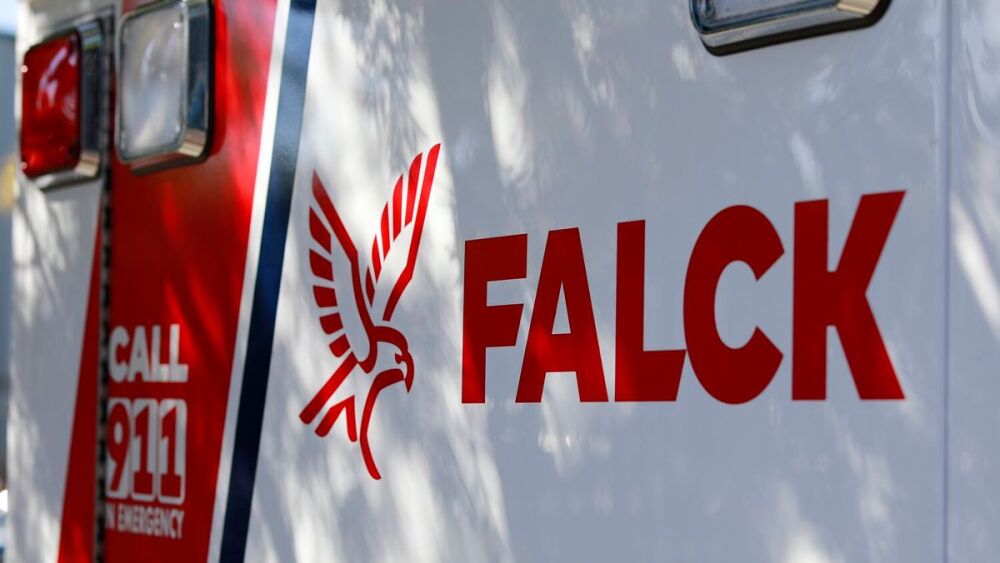David Garrick
The San Diego Union-Tribune
SAN DIEGO — Steep fines for poor emergency response times have prompted San Diego’s new ambulance provider to start mandating overtime shifts for paramedics and to revamp its operations at the U.S.- Mexico border.
Falck USA, which took over San Diego’s ambulance operations last November, was fined $351,000 during the second quarter of the year — April, May and June — for more than 50 excessively long response times and for exceeding response-time goals in some areas.
Frustration with Falck’s poor response times and other problems since the company took over have prompted city officials to request a financial analysis of taking ambulance service away from Falck and merging it into the city’s Fire-Rescue Department.
Falck officials concede they are struggling to live up to their contract with the city, but they stress that Falck is providing more comprehensive ambulance service than San Diego has ever received — despite a nationwide shortage of paramedics.
While Falck is not providing the 1,008 hours per day of ambulance coverage required in its contract, the company is averaging 936 hours per day — well above the average of 840 hours per day provided by American Medical Response before it was replaced by Falck.
Falck officials also say its numbers will soon improve when it implements mandatory overtime shifts later this month and completes negotiations with the U.S. Border Patrol on new protocols for emergencies at the San Ysidro crossing.
Fire-Rescue Department officials declined requests for interviews, but they said in a statement that city officials are continuing to work with Falck to ensure it meets its contractual requirements.
“We are optimistic and will continue to monitor Falck’s performance and hold them accountable to the contract,” the department said in the statement.
The statement also said that the analysis of bringing ambulance service in-house is under way, but there is no estimated date of completion.
Falck’s labor contract with its employees allows the company to mandate overtime, a move Falck officials said they’ve previously been reluctant to make.
The new policy, called “mandation,” will require workers to perform one or two extra shifts per month, said Jeff Lucia, Falck’s communications director for San Diego. They will get paid double their normal wages and get at least 10 days advance notice of a mandated shift, he said.
Tony Sorci, president of the San Diego Association of Prehospital Professionals, which represents Falck’s workers, did not respond to requests for comment on the new policy.
Falck officials say the new policy is required partly because the company has only 104 full-time paramedics, well short of the 134 needed and the 148 it would like to have so it can cover vacations and sick days.
Falck will also revamp how emergencies are handled at the border, partly because many of the fines levied against Falck are the result of slow response times in the southern part of the city.
Of the $90,000 in fines Falck was charged for poor response times in geographic zones, $60,000 of the money was for poor response times in the city’s southern zone. And of the $261,000 in fines for excessively long responses to individual calls, $70,000 was for incidents in that area.
Falck spokesman Troy Hagen said a key element of those numbers is verbally reported emergencies by people crossing the border, which border patrol agents automatically classify as high-priority calls even if they are truly low-priority calls.
In the rest of the city, emergency calls are routed through dispatchers who evaluate the priority level of the emergency, Hagen said.
“We are depleting our resources, really, unnecessarily,” he said. “We’ve been working closely with the Border Patrol, and we’re reconfiguring that entire south zone.”
The new approach is likely to include stationing an ambulance at the border, he said.
Falck officials also blamed the company’s poor response times on delays at local hospitals and sharp increases in calls for ambulances.
Staff shortages at hospitals since the start of the COVID-19 pandemic are lengthening the amount of time Falck ambulances spend dropping off patients before they can leave and get ready to handle the next emergency.
“When hospitals don’t have enough staff to move people out of the ER or through it into the hospital by admitting them, the patient flow backs up,” Lucia said. “That means that ambulance patients who are stable end up waiting in the ambulance or in the hallway on the ambulance gurney for hours sometimes.”
Falck officials said wait times at local hospitals have risen by 53 percent since April.
“Basically, the hospitals are using ambulances as another waiting room,” Hagen said. “It takes that ambulance out of service.”
Another problem is call volume, which has risen 17 percent since April. Falck was handling 424 responses per day then but has been handling more than 500 per day in September, Lucia said.
Shifting ambulance service in-house would be a major change for San Diego.
Falck pays San Diego a $9 million annual flat fee, maintains a fleet of 66 ambulances and pays salaries for all paramedics and emergency medical technicians.
In exchange for that payment, Falck gets the opportunity to bill patients who receive ambulance care directly. In its proposal to the city, Falck projected it would receive nearly $75 million in annual revenue.
___
This story originally appeared in San Diego Union-Tribune.
©2022 The San Diego Union-Tribune












